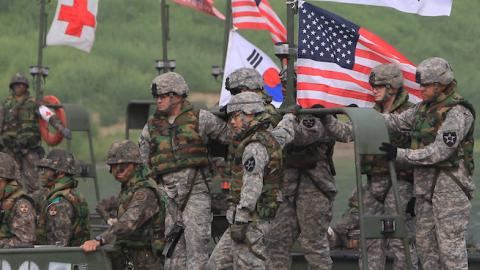Gen. James Mattis travels to Japan Friday on his first trip abroad as U.S. secretary of defense. What he will find when he arrives is a crisis-prone region that, without a firm American hand, poses risks to America’s interests.
The U.S. has not faced a more dangerous security environment in Asia since the end of the Korean War. North Korea is soon expected to test a new intercontinental ballistic missile that could threaten the American West Coast and might dangerously alter North Korean and counterproliferation calculations.
Meanwhile China has grown more adventurous and provocative in the South and East China Seas, expanding its military bases on artificial islands created out of disputed territory. It recently sailed an aircraft carrier through the Taiwan Strait and flew strategic bombers between South Korea and Japan, provoking both American allies to scramble their interceptors. It continues to assert its unlawful sovereignty over international waterways. In December it sparked a diplomatic furor when it seized a U.S. underwater drone, which it eventually returned.
Some experts say the failure of President Obama’s vaunted “pivot to Asia” is the root of the problem. With China and North Korea stronger and emboldened, America’s Asian allies are bewildered and alienated, while neutral nations in the region wonder if a new global order is emerging—one that points toward China and away from the U.S.
In fact, this is all the result of deliberate policy choices, ones the Trump administration must reverse to restore stability and preserve peace in the region. In retreating from the Middle East and abandoning Ukraine to Russian aggression, the Obama administration contended America wouldn’t lose prestige around the world. It was wrong. Asian powers, especially China, have noted the U.S. failure to enforce the “red line” in Syria, the withdrawal from and abandonment of Iraq in 2011 while planning to do the same in Afghanistan, and the stiff-arming of America’s longtime ally Israel, most recently in the United Nations Security Council.
President Obama’s appeasement of Iran’s ayatollahs to achieve a nuclear deal—shaky at best, fraudulent at worst—sent the same message: America rewards aggression and punishes loyalty.
A shrinking U.S. military has also undermined regional confidence. Since 2008, America’s forces have undergone the most substantial disarming since the end of the Vietnam War. Between the Obama budget cuts and sequestration, the U.S. Navy is on target to be smaller than it was before World War I; the Army, smaller than in 1940; and the Air Force will have fewer planes than at any time since World War II.
Every Asian nation understands that a 287-ship U.S. Navy won’t be able to pivot to anyone’s defense across the broad reaches of the Pacific. President Obama’s efforts to slash America’s nuclear arsenal, which allies have relied upon for two generations to deter nuclear-armed aggressors, has only added to regional uncertainty.
Finally, there was President Obama’s demurral to Beijing’s aggressive and illegal misdeeds, from its bullying in the South China Sea and threatening of Japan to serial and continued cybertheft. This forbearance was supposed to induce China to sign and honor multilateral agreements on issues such as climate change.
Instead, in the wake of these events, we see, most notably, China’s increasing militarization of the Spratly Islands, North Korea’s undiminished misconduct, Japanese concerns, and the Philippines’s threatened ouster of U.S. forces.
These policy mistakes are particularly dangerous in the Pacific Rim. America’s defense relationships with its Asian allies are bilateral, like spokes in a wheel. There is no multilateral security framework there comparable to NATO. Take away the U.S. hub and the entire system falls apart.
To restore U.S. strength and prestige in the Pacific and rebuild trust and alliances, America needs to reassert its traditional presence and role in the region. Mr. Mattis must assure allies that the U.S. is rebuilding its military capabilities, both in the near term with a stronger Navy but also in the long term with cutting-edge weapons systems that will increase America’s defense advantage.
China needs to realize that its aggression has real-world consequences, not just rhetorical ones. President Trump may already have signaled this with his contact with Taiwan and declarations that tariffs may be coming.
Beyond the nuclear umbrella, the U.S. must encourage tighter and stronger multilateral military ties with friends such as Australia, Japan and South Korea, as well as other Asian states that require America’s help in facing the China challenge. This should include joint defense-technology and production agreements that make America and its allies in the region stronger and more secure.
A sea change is coming in the Pacific. The U.S. must show its friends the way forward, or the growing crisis in East Asia may reach a point of no return.
















